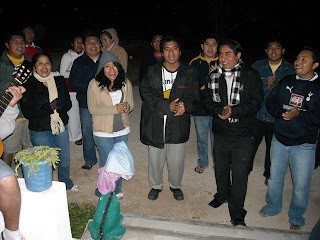
Friday was Celestún. Saturday was Izamal. Sunday was Motúl. Today is Wal-Mart…and Monte de Olivos church, where Nancy is tutoring several young adults in English. And then there are the classes I teach...

In 1979 the lagoon at Celestún was designated as a world Biosphere Reserve. It is home to one of the largest population of flamingoes in the world, pristine mangrove stands and the Ojo de Agua (Eye of Water), a spring that gushes out of the ground to feed fresh water into the brackish lagoon.

Located on the west coast of the Yucatan Peninsula, about an hour and a half west of Merida, the town of Celetsún is a beach town, but has none of the glitzy development of some of the other towns of the peninsula such as Progresso, Cancun and the towns of the Mayan Riviera. The flamingoes are at their peak in December and May, but enough reside in the lagoon year round to make it a spectacular destination. And it is well organized.

There is one park center where tickets are purchased, and one area where boats wait to take visitors on the hour or two hour trip. The boat owners seem to take turns so there is no hassling or hustling, and the route is set for all. Since the peso has now fallen about 50% in value relative to the dollar, our trip was both a bargain and a joy. And the fish meal on the beach was the same…

Izamal is a town about an hour and a half east of Merida. It is the location of one of the oldest and largest monasteries in Latin America, one important enough to have been visited by Pope John Paul II and designated by him as a status just under that of a basilica.

The monastery and church were built on the ruins of a Mayan pyramid, one of the five that are still features of the city. The city had been abandoned by the time the Spaniards arrived, and the pyramids were in ruins—having lost some of their height and mass as locals would use the cut stones of the pyramids to build their houses. Even with these losses the largest of the pyramids is said to have the second greatest mass of any the pyramids of the Meso-America.

We visited Izamal that particular day because our host was teaching an extension class there, in a Presbyterian church that has as its back wall one of the sides of the large pyramid. I wonder if it is a plus for real estate value to describe your property as a pyramid-view property?

In any case, while he was teaching Nancy and I visited the monastery, walked around the beautiful town, and sat on the square watching the people and drinking a coke. A great way to pass a couple hours…
Motúl is about an hour east of Merida on a road slightly to the north of the road to Izamal. The occasion for our visit was an invitation by one of my students to preach and officiate at the communion service of the church he serves, one of the Presbyterian churches in the town. In the morning Nancy and I had attended worship at the downtown Presbyterian church in Merida, Divino Salvador, but most churches have their main service in the evening, which is when we went to Motul.

The church was packed, the singing was enthusiastic, and the spirit of the mixed congregation--young and old—was joyful. I have now preached three times in three weeks, and each time is a privilege and an experience. The Maya people are generally a reserved people, and it shows in their worship. But with the praise band blaring, the sound system turned up to its maximum (the only setting I have experienced) and the young people leading in singing, there is plenty of volume and enthusiasm to go around.

Carnival began on Thursday, and will continue until Tuesday. The primary impact of the celebration in this city is to bring in a crowd of tourists and turn the main boulevard into a nightly parade route and a mile long beer stall. The Catholic Church does not discourage its followers to avoid the celebrations, but does advise exercising moderation. The evangelical churches (evangelical in Latin America means all non-Catholic) urges avoidance. There is always a youth camp out of town during the Carnival season, and the message at Divino Salvador was a clear one about keeping away from the goings-on, about how friendship with the world makes a person an enemy of Christ (James 4:4).
The atmosphere of Carnival does give reason to pause and consider to what extent a believer should participate, and what it means to be in the world but not of the world. I do not believe that as believers our primary identity should be a negative one, that is what we keep away from or do not do. Yet there are clearly boundaries to recognize and activities that are inappropriate. The hard thing is to know what they are and to make a statement that is positively directed towards something better. How to do that is something each follower of Christ ought to ponder. We are challenged by Paul not to be conformed to this world but to be transformed by the renewing of our minds…(Romans 12:2) Too often we do not meet this challenge—and too often we do not even think about it. But it is at the heart of our faith and the heart of the abundant life Christ came to give to us…Perhaps we should be more intentional about living out our faith in our culture. And maybe not just at Carnival season but all year round…







































